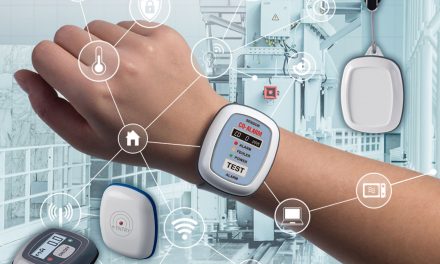Automation has undoubtedly come a long way since General Motors launched its first industrial robot on its assembly line in the 1960s. Now, we have automated chicken butchers, burger flippers, welders, hotel room cleaners, and even a robotic nurse. But automation is not only taking over production and manufacturing industries. Small and medium-sized businesses are starting to gear towards the automation of many office-based mundane and repetitive tasks, such as payroll preparation, recruitment process, website traffic tracking, and email marketing.
According to Fortune Business Insights, the global automation market reached $168.81 billion in 2019 and may grow to $326.14 billion in 2017. Furthermore, the World Economic Forum (WEF) predicted there would be 97 million new jobs by 2025 due to the rise of machines and automation. Among these jobs are data analysts, artificial intelligence and machine learning specialists, process automation professionals, and software and applications developers.
Companies are embracing automation because of the many benefits. It guarantees improvement in workplace safety, speeds up time-consuming tasks, and simplifies processes. More importantly, automation results in higher productivity, better quality, fewer errors, and overall cost efficiency. The future of work will be different from what we witness today. And automated systems will be at the centre of how businesses and industries will do things.
With that said, there is no better time to consider a career in automated systems than now. But which jobs in this field are most in-demand? What would your tasks and responsibilities be? Which industries would be the right fit for you? Here is our list of the top automated systems careers.
Automation/Control Software Engineer
The primary responsibility of automation or control software engineers is to create and develop automated solutions for both software and hardware processes. They ensure that services and operations continue without the help or need for human intervention. One of their most crucial roles is to run tests on systems to identify bugs and correct quality issues. These engineers also collaborate with other teams to determine how automation can make workflow more efficient.
Based on 1744 salaries surveyed by talent.com, the average salary for automation or control software engineers in the United Kingdom is £42,259. Entry-level positions can get £37,500 per year. However, experienced candidates can earn up to £52,500.
Automation engineers can work in the energy industry, automotive, pharmaceutical sector, manufacturing, or shipping and distribution.
PLC Engineer
Programmable Logic Controllers or PLCs are industrial computers that automate processes, machine functions, or entire assembly lines. They get data from integrated sensors or input devices, process the information, and activate outputs based on pre-set parameters. For instance, pressing a button can control lights, motors, pumps, circuit breakers, or other machinery in factories or industrial plants. PLC engineers design and develop control programmes to run production lines, robotic devices, electrical machinery, and other manufacturing equipment. They also test these systems to ensure their safety, functionality, and reliability.
The average national salary in the UK for PLC software engineers is £41,500 annually or £21.28 an hour. Highly experienced engineers earn up to £50,000 while entry-level workers make a starting pay of £37,500.
PLC engineers are sought-after by production and manufacturing sectors, including automobile, oil, gas, and steel industries.
SCADA Engineer
Supervisory Control and Data Acquisition or SCADA are systems that allow industries to monitor and control field devices and industrial processes locally and remotely. It enables organisations to interpret real-time data, which helps maintain efficiency and reduce the possibility of downtime. SCADA engineers are the ones who develop, implement and monitor SCADA systems that control the processes in the industry. Not only do they design hardware and software control systems. They also evaluate them to ensure effectiveness and functionality. Additionally, these engineers conduct maintenance, handle upgrades, and create troubleshooting procedures for emergencies.
Based on 1089 salaries, SCADA engineers receive an average of £45,000 annually or £23.08 per hour. The base pay ranges from £37,500 for entry-level positions to £59,000 for senior engineers. Specific factors, such as location, type of industry, education, qualification, and experience, affect how much an engineer earns.
SCADA engineers can work in manufacturing or process industries that have transitioned fully or partially to automation. These sectors include automotive, oil, gas, and steel industries.
Robotics Engineer
A robotics engineer is responsible for designing, building, developing robots and robotic systems to take over mundane or repetitive tasks typically performed by manual labour. The primary goal of robotics engineers is to lighten the workload while increasing productivity and improving product quality. These machines ultimately help make operational processes safer, faster, and more efficient. Other engineers design machines that build and assemble the robots.
The use of robotic systems or machines is also increasing in industries outside manufacturing and production. Some engineers design state-of-the-art toys, construct animatronics for the entertainment industry, invent automatons for ocean or space exploration, or research artificial intelligence and nanotechnology robots. Robotics engineers combine computer science, cognitive psychology, electronics, and mechanics to optimise the functionality of their creations.
Robotics engineers in the UK can make £42,500 per year, which is the national average salary for this profession. Employees under entry-level positions can earn £35,000, while experienced engineers can get paid as high as £59,525.
Among those that employ robotics engineers are aerospace, appliance, automotive, food packaging, and electronic industries.
Electrical, Control and Instrumentation Engineers
Electrical control and instrumentation engineering is an offshoot of electrical engineering. This field focuses on designing and developing control systems, devices, and equipment used to monitor and run industrial processes. They implement strict supervision, regular maintenance, and periodic evaluation to ensure the systems remain efficient, effective, and safe. Their primary goal is to attain optimal productivity and consistent functionality while sustaining health and safety standards. These engineers should also be skilled in programmable logic controllers (PLC), advanced process control (APC), distributed control systems (DCS), and supervisory control and data acquisition.
The average salary in the UK for electrical control instrument engineers is £40,000 annually or £20.51 hourly. Starting pay for graduates or entry-level positions is £33,064, while experienced and senior-level engineers may earn between £50,000 to £75,000. You can find further details about jobs on industrial control engineering recruiters websites like Samuel Frank Associates, who are experts in the field of control and automation recruitment.
Almost every industrial facility that deals with repeatable production needs electrical control and instrumentation engineers to handle their process instrumentation and control equipment. These sectors include automotive, food and beverage, oil and gas, nuclear plants, petrochemical, manufacturing, and wastewater treatment.



